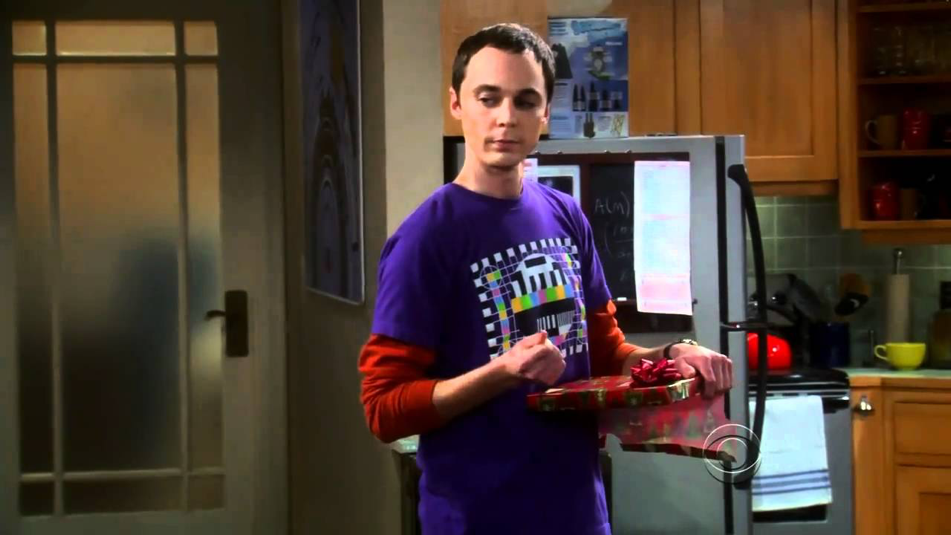Until the beginning of the 1990s, the humanities department at the University of Bern (Switzerland) lived a kind of cellular life, fragmented into the smallest possible units, a diaspora existence in scattered houses. With the construction of the Unitobler in 1993, the humanities were given a center that would make it possible to live side by side, with one another and together. The humanities new “home” was the former Chocolat Tobler factory. Created by Theodor Tobler in Bern in 1908, Chocolat Tobler was the place of origin of the Toblerone, one of Switzerland’s icons with its distinctive triangular shape. Since 1993, the old Toblerone factory is now part of the city’s university. The so called “Unitobler” at the Länggasse is the home of the Faculty of Humanities. The heart of the Unitobler in every respect is its library, built into the newly created inner courtyard of the Tobler Factory.
Via the Entrées, built of glass blocks, visitors enter a vast and unique space, not only because of the huge book towers and the ambivalence of inside and outside. But mainly, because the library consists of a labyrinthian assemblage of rhombic platforms on six different floors, all connected via bridges and spiral staircases, and (mostly) accessible from the surrounding institutes in the old building. Thus, at least in spatial terms, most of the disciplinary libraries are merged into one single large library. The basic idea is to assign the individual platforms directly to the institutes housed in the old building. The bridges connect the institutes with the library und thus all the institutes with each other.
Given the labyrinthine arrangement, one is reminded strongly of Jorge Luis Borges’ short story of the Library of Babel – and it appears unlikely that the architect himself did not have Borges in mind. Borges’ seminal 1941 story imagined an almost infinite library containing every possible combination of letters in a vast collection of 410-page books.
That’s how Borges’ narrator describes it:
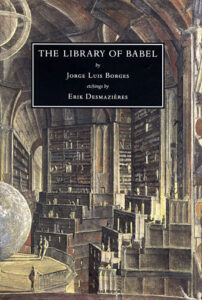
“The universe (which others call the Library), is composed of an indefinite and perhaps infinite number of hexagonal galleries […].”
“Each wall of each hexagon is furnished with five bookshelves; each bookshelf holds thirty-two books identical in format; each book contains four hundred ten pages; each page, forty lines; each line, approximately eighty black letters. There are also letters on the front cover of each book; those letters neither indicate nor prefigure what the pages inside will say.”
“In all the Library, there are no two identical books. From those incontrovertible premises, the librarian deduced that the Library is “total” – perfect, complete, and whole – and that its bookshelves contain all possible combinations of the twenty-two orthographic symbols (a number which, though unimaginably vast, is not infinite) – that is, all that is able to be expressed, in every language. All the detailed history of the future, the autobiographies of the archangels, the faithful catalog of the Library, thousands and thousands of false catalogs, the proof of the falsity of those false catalogs, a proof of the falsity of the true catalog, the gnostic gospel of Basilides, the commentary upon that gospel, the commentary on the commentary on that gospel, the true story of your death, the translation of every book into every language, the interpolations of every book into all books, the treatise Bede could have written (but did not) on the mythology of the Saxon people, the lost books of Tacitus.”
Borges narrator invokes a total library – containing not only every possible permutation of its character set but all possible meaning. Despite—indeed, because of—this overkill of information, all books are totally useless to the reader, leaving the librarians in a state of suicidal despair. This leads some librarians to superstitious and cult-like behaviors, such as the “Purifiers”, who arbitrarily destroy books they deem nonsense as they scour through the library seeking the divine hexagon and its magical books. Others believe that since all books exist in the library, somewhere one of the books must be a perfect index of the library’s contents; some even believe that a messianic figure known as the “Man of the Book” has read it, and they travel through the library seeking him.
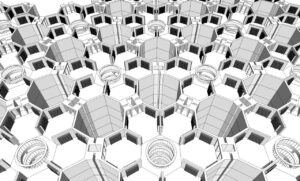

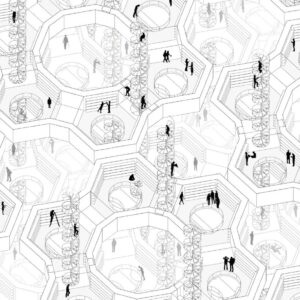
Borges narrator invokes a total library – containing not only every possible permutation of its character set but all possible meaning.
Compared to the Babylonian version, the one at Unitobler – even though its labyrinthian structure suggests a totality – most obviously is not nearly total. The courtyard containing the library is 75 meters long and 24 meters high and can host a maximum of 750 000 books. Of course there were more ambitious attempts to realize the library of the future, which seem to have originated even more directly from a Borgesian dream, e.g. the Biblioteca José Vasconcelos in the downtown area of Mexico City, declared a “megalibrary” by the time of its inauguration in 2006 with the possibility to store up to 2’000’000 books. Still, two million titles is no more total than 750’000…

But the shelves and walls of brick do not delimit the amount of storable knowledge anymore, do they? I do not mean the possibility of interlibrary loans or shared catalogues, but the possibility to access a seemingly infinite amount of free or paid online repositories in the Multiverse, whether its Google Books (30m books) or Kindle Store (3.2m). Indeed, one has not to be a doomy prophet to predict that the local physical library in the age of globalized mass digitization and e-books might eventually become a thing of the past. Google, among others who worked on electronic text repositories since the 1960ies, were always aiming at or at least advertising totality, as Christopher Rowe points out:
“Google’s originally stated objective was no less than ‘to organize the world’s information and make it universally accessible and useful.’ Kevin Kelly, commentating the project, declared in a New York Times article that this new universal library would eventually offer ‘the entire works of humankind, from the beginning of recorded history, in all languages, available to all people, all the time’, including in its scope digital versions of all paintings, films, recorded music, television programs, every piece of print media and every internet site ever to have existed.”
If this would become true, then one might say that Borges idea of a total library – echoing a Western dream of two thousand years (or since the library of Alexandria) – manifests itself in the Unitobler library’s digital extension. The (neoliberal) dream of connection, calculability, universality, availability, which is itself a wetdream of totality, has come true in the digital age. Borges’s writing thus pre-programed its technological progeny…
Indeed, not long ago, a very smart PhD student has created a digital version of Borges’ library: Jonathan Basile has spent six months learning how to make a virtual version that can generate every possible page of 3,200 characters. Libraryofbabel.info currently allows users to choose from about 104677 potential books. Let’s try then: hexagon/chamber 1000, wall 1, shelf 4, volume 5 is the signature of a book named “hf,.bh yrfs uthetrv”:
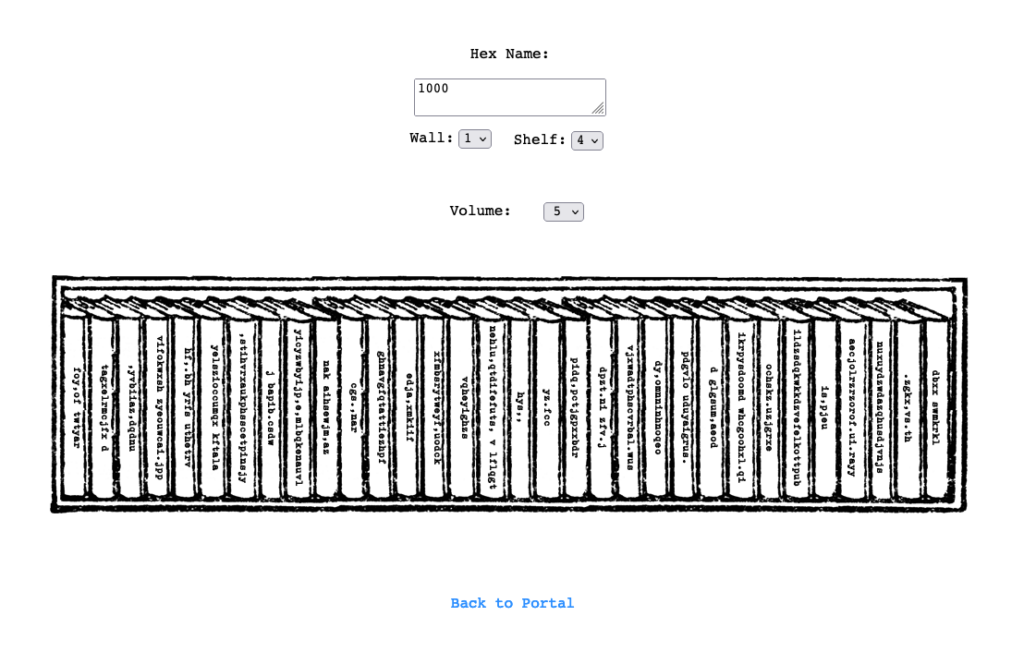
The title sounds promising, so we immediately dig into page 1:
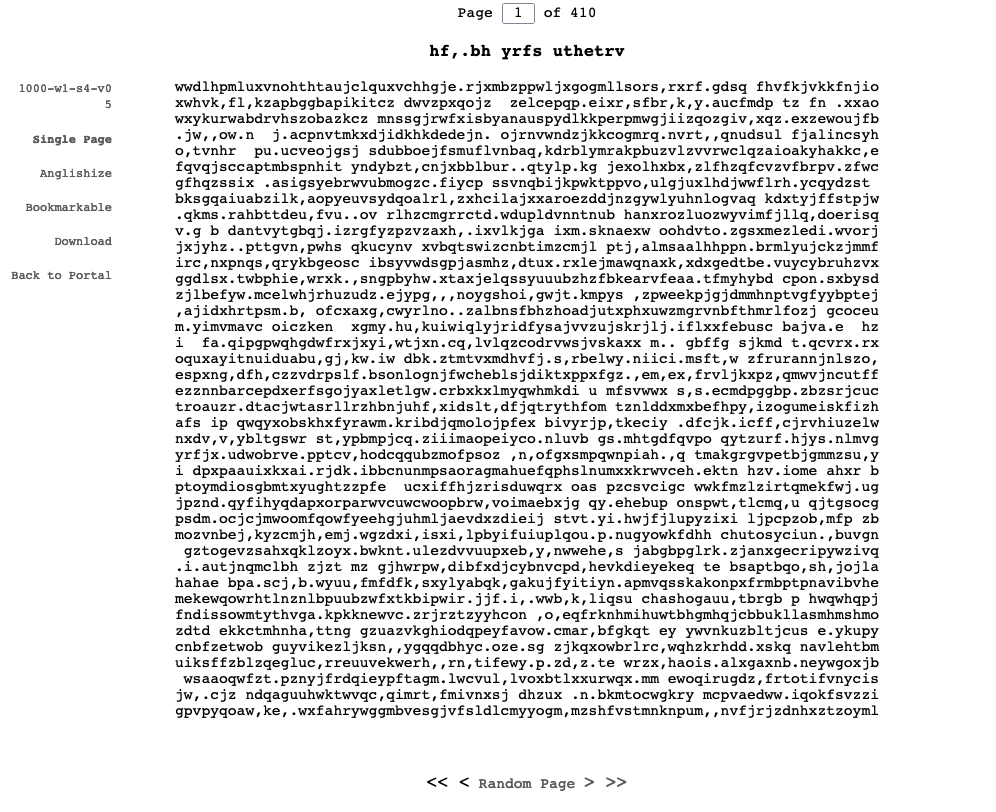
The site also features a search tool, which allows users to retrieve the location in the library of any known page of text. Any individual page of Hamlet or the Bible can be found in the library, but the possibility of finding any other page from the same work in the same volume is vanishingly small.
There is currently one restriction: While the library contains every possible page, it does not yet hold every possible combination of those pages. If this restriction were lifted, Basile explains, the library would house “every book that ever has been written, and every book that ever could be – including every play, every song, every scientific paper, every legal decision, every constitution, every piece of scripture, and so on”. But the thing is that Basile himself – after facing several difficulties in building his website – came to the realization that he was trying to faithfully recreate an impossible dream.
First but not mainly because of the impossibility to click through all the books. For example: If a user clicked through the books at a rate of one per second, it would take “about 104668 years to go through the library”.
Second and more importantly, while being able to find any text one can type out makes indeed for a different experience of the library, yet it still doesn’t satisfy the drive for discovery created by the fantastic potential of its books. The desire produced in most visitors to the site, as it was for Borges’s librarians, is to discover what they do not already know – to find the lost gospels, or the cures of diseases, or the true story of one’s own death. All of it is contained on one of the library’s pages – and the fact that one can find anything one looks for only makes it more frustrating. What we want is to find what we don’t already know and what we don’t know how to look for.
And finally and most importantly, Basile’s attempt to create totality failed because Borges himself has created his library as self-contradictory in every aspect, from its architecture to its pretense of housing all possible expression. The Library of Babel was imagined as containing every possible permutation of a basic character set (22 letters, space, comma, and period) over 410 pages. This much is certainly possible computationally—the website now contains every possible page of 3200 characters from a similar set—but the dream of a universal library is still elusive. Beyond the contingent limits of its small set of Roman characters, the length of its books, and its medium, there are essential reasons why no amount of writing can exhaust the possibilities of meaning. A text exists in what Borges calls an infinite dialogue with its recipients, and its endless recontextualization guarantees that even without a mark of difference every book, page, and even letter can differ from themselves. Our libraries do not fall short of universality because of a character or a book we’ve left out, but because totality itself is essentially incomplete. If someone knows about that, that’s us humanities’ scholars, isn’t it? You don’t have to be a Derridian to come to this conclusion: you cannot exhaust semiosis through the sheer force of calculation (as in Borges and Basile) or obsessive collection (as in Linné or Google). Meaning happens discontinuously, and it happens interactively. And a certain meaning is never magically tied to certain letters.
Basile says that the more he comprehended the dimensions of the library, the more he felt that Borges was treating the poor inhabitants of his library with a kind of loving irony. By no means does he mock them; if anything he shares their plight, and feels that we all do, because the librarians are us.
Let’s finish our deliberations with a few tentative theses:
- There is absolutely no reason to imagine our digital technologies to have totalized or will ever totalize the possibilities of expression and communication. There can never be an exhaustion of meaning through algorythmic calculation. Furthermore, digital technology does not create more meaning, and certainly not more “truth”. We all know that the indifference towards meaningfulness (let alone “truth”) evidenced by computational algorithms is directly and dangerously linked to a relativization of knowledge in our digital age – not least by confounding information with knowledge. There is an overwhelming amount of information to be found in the library of Babel and Basile’s combinatory machine, but nothing in it is in and of itself meaningful.
- Borges–contrary to some recent Borges scholars–did not in a trivial way anticipate hypertext and the internet and he is by no means a heraldic or euphoric forerunner of the technology of the new millenium. His narrator of “The Library of Babel,” a librarian living (a basically tragic life) within its hexagons, of course relentlessly asserts its totality and infinity. But Borges himself is not envisioning the possibility of that totalization at all. If anything, as Basile says rightly, Borges succeeds in predicting our contemporary moment because, with an ironic smile, he expresses the lack of totality, the finitude and uncertainty that plague even the grandest projects of any cognition. Only in this sense does Borges’ writing pre-program its technological progeny – “not by containing a totality of all past and future possibility, but by playing with the gap that disrupts all identity” (19).
- The Unitobler library (with or without its digital extension) does resemble Borges’ library of Babel – not because it is total, but because of the irony that in its provinciality it promises universality and totality and fails. You do not even have to highlight the many disruptures of the digital world (Unitobler’s electronic extension), its virtual bubbles, grids, filters, triages, barriers, cash points etc. in order to make my point. For example: even though most disciplinary platforms at Unitobler are spatially connected with bridges and stairs, there are–more often than not–metal doors or even walls that prevent you from going from one library to another. Architecturally the connections are potentially there, organisationally they have never fully been implemented. One cannot go directly from the library of the English department to the Unitobler central library on the base floor…
- Finally, there might be one view of redemption of Unitobler’s (and by extension also the internet’s) failed attempt of totality. It fails to achieve totality by realizing others. Confined within the delimitations of its surrounding courtyard we find some 500’000 physical books–each of them more or less carefully handpicked by scientifically trained staff to be integrated into systematic topical collections, and each of them a stable meaningful unit that–unlike hypertexts, which work against closure–retain a relatively permanent identity. I agree with Christopher Rowe: “the book is the tangible product of a sophisticated epistemological system which is wholly distinct from that of information technology, and whose essential properties [so crucial especially for the Humanities] remain deeply entrenched in its very materiality.” And one might ad that the same is true for a good systematic collection of physical (or digital) books whose essential property remains entrenched in its meaningful spatiality or at last a meaningful analogue or digital catalogue (curating collections is not fundamentally different digitally than physically – availability and access remains mediated). In short: the authors of the books to be found in Unitobler Library are no typewriting monkeys and neither are the librarians. My first job at the university was as a library assistant at the Institute of Social Anthropology, and I remember sticking colored signatures on books that I was about to place on the shelves of the anthropological hexagons in the Unitbler library: ET WEISS AF 0.16a is the signature of “Traurige Tropen”, a German translation of one of the most famous books by Claude Lévi-Strauss. Next to it you will its English translation (ET WEISS AF 0.16b). ET WEISS AF 0.17, the next on the shelf, is Lévi-Strauss’ “Wildes Denken”. At least for BA students this is a perfectly sensible and helpful spatial arrangement
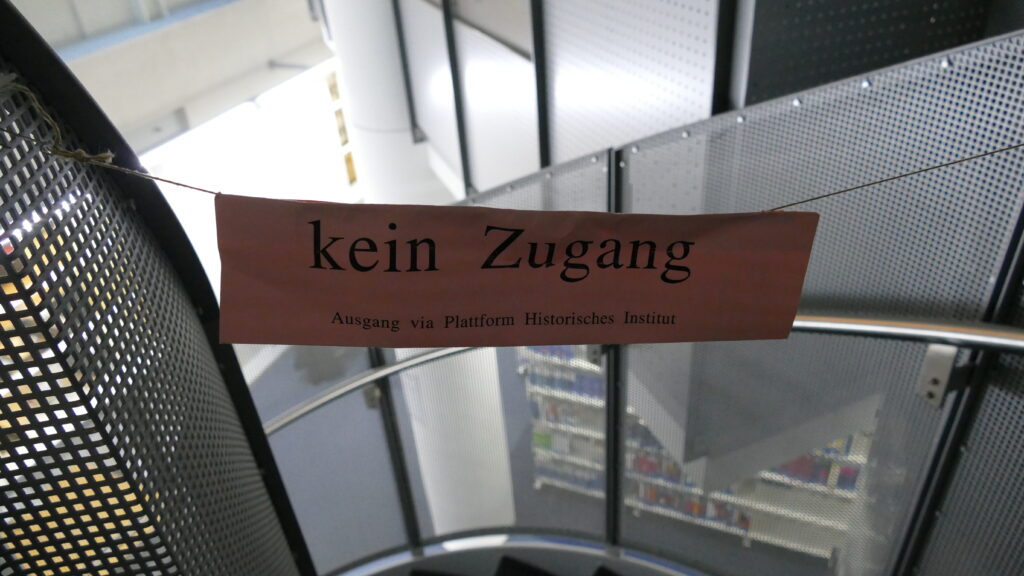
There are thus good reasons why the Humanities don’t have to euphorically board the high speed train of neoliberal technophilia or uncritically advancing academia’s fancy agenda of digitalization, globalization, calculation, and mediatization–or generally be in service of any kind of totality. Even though we participate and even sympathize–because there is hardly any virtue in ignoring the times we live in–, we as humanities should have our critical eyes on some of the all too euphoric promises of the digital age by carefully tracing present and past medial and pluri-medial dynamics, relations between creation, mediation, translation, collection, perception and performance, image, material, sound and text with its expert and non-expert actors, always already influenced by powerful regimes of truth. We are well equipped to highlight the disruptures, gaps and margins, which are integral to every dream of totality. And we have to listen to what those have to say who are left behind in this dream, because, in the end, every dream of totality is a nightmare. Borges knew this better than anyone:
“One of the habits of the mind is the invention of horrible imaginings. […] I have tried to rescue from oblivion a subaltern horror: the vast, contradictory Library, whose vertical wildernesses of books run the incessant risk of changing into others that affirm, deny, and confuse everything like a delirious god.”
References:
Basile, Jonathan Edward 2018: Tar for Mortar: “The Library of Babel” and the Dream of Totality. California: Punctum Books. https://punctumbooks.com/titles/tar-for-mortar/
Borges, Jorge Luis 1939[1]: The Total Library. Online: https://www.gwern.net/docs/borges/1939-borges-thetotallibrary.pdf
Borges, Jorge Luis 1964: The Library of Babel. In: Yates, Donald A., James E. Irby (eds.): Labyrinths: Selected Stories & Other Writings. New York: New Directions Publishing. Pp. 51–58.
Mandal, Anthony 2015: What fiction has to say about the libraries of the future. The Conversation UK. Online: https://theconversation.com/what-fiction-has-to-say-about-the-libraries-of-the-future-36314
Rowe, Christopher 2013: The new library of Babel? Borges, digitisation and the myth of the universal library.
First Monday, Volume 18, Number 2 (4 February 2013). Online: https://journals.uic.edu/ojs/index.php/fm/article/download/3237/3416
